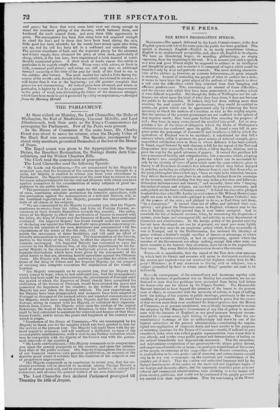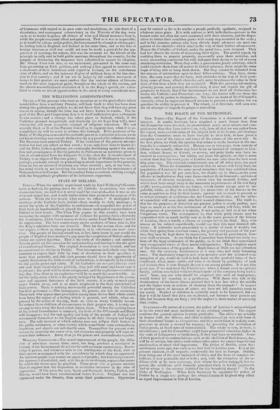THE KING'S PROROGATION SPEECH.
THE PRESS.
STANDARD—The speech delivered by the Lords Commissioners, is the first Entslish speech with NV hch for some years the public has been gratified. This speech is thorough English—English in its manly unambitious idiom— English in its straitforward perspicuity, and, above all, English in its objects. We have no blundering tropes, no maudling philanthropy, no empty vapouring, from the beginning to the end. It is in mannerjust such a speech as a wise and good Prince might be supposed to address to an intelligent and thoughtful people, and in matter it is composed of topics which could be furnished only by wise and patriotic counsels. The most striking character- istic of the address is, however, an extreme forbearance—its great triumph !s modesty. Instead of reminding the people of what its authors have done, it seems to have been the great object of the authors of the speech to draw a veil over the difficulties which they inherited from their bungling and officious predecessors. This, considering the amount of those difficultive, and the success with which they have been surmounted, is a sacrifice winch it were difficult to parallel. But though the Duke of Wellington and his col- leagues are silent upon the head of what they have done, it does not become the public to be unmindful. If, indeed, they had done nothing more them arresting the mad career of their predecessors, they would be entitled te praise—to praise which can be appreciated only by estimating the force necessary to check the motions of a machine so vast as this mighty empire. But the services of the present government are not confined to the sphere of that negative merit ; they have gone further than arresting the progress of evil ; they have, in many cases, turned the mischief into good. Let us reca- pitulate a few of the items of obligation which the Duke of Wellington's administration has conferred upon the public. It found a corn bill in pro- gress under the patronage of economist; and levellers—a bill by which the agriculture of England was to be sacrificed ; it substituted for that bill a measure which, while it protects the great source of national strength, gives unqualified satisfaction even to those in whose defiance it has been carried. It found, urged forward by mob clamour, a bill for the repeal of the Test and Corporation Acts nominally—but, in effect, a bill to legalize Atheism, and to pave the way for the quick advances of popery. It turned this pestilent bill into a measure 'of healing and comprehension, into a measure which, adopting Mr. Locke's two exceptions with a precision which can be accounted for only by the identity of views or'great minds upon the same subjects, gives in theory to all Protestant dissenters that toleration which they before. enjoyed in practice, excluding no religionists whatever from it, save first those who, as the great philosopher above cited says, " have no right to be tolerated, because they deliver themselves ipso facto to an authority distinct from tile sovereign of the country, notwithstanding that they may make a frivolous and fallacious distinction between court and church ;" and secondly, those who " denying the author of nature and religion, are not held by promises, covenants, and uaths,which are the bonds of Iminan society." It found the executive pledged to admit that class whichMr. Locke (as wise a man as Mr. Wilmot Horton) says onght not even to be tolerated—pledged to admit tbe Roman Catholics into all the powers of the state ; and 'pledged to do so, as Earl Grey told them, " by a conspiracy." It turned them out of office, and defeated their con- spiracy ; and placed the Protestant cause in England, whatever may be the case in Ireland, on higher ground than it ever before occimpied. And to conclude the list of domestic services, it has, by renouncing the despotism of system, given hope, and consequent life and activity, to every department of commerce and manufactures. As the foreign policy of the present ministry has not been developed, nor can be at present, we must pass more lightly over it ; but that must be an auspicious policy which, finding us actually at war in Portugal, and in the Mediterranean, has restored the blessings of peace without a feather's weight sacrifice of honour or advantage, in which we have not wasted a cartridge, or lost an opportunity, against which the
enemies of the Government can allege nothing, except that other states are more romantic in the hazards they adventure, more lavish in the expenditure they incur. May every British Administration deserve like censure.
TIMES—It is remarkable, that the repeal of the Test Act—that measure by which both its friends and enemies will agree to distinguish exclusively the session just orpired—has not received the slightest notice from his Ma- jesty's Ministers ; as if any accession to liberty, civil or religious, was a subject proscribed by those in whose names Kings' speeches are wont to be delivered.
Sex—In consequence of the extraordinary and dexterous rapidity with which the business of parliament was on Monday last concluded, we are au- thorized to state that two petitions were prevented from being laid before the house—the one for reform by Sir Francis Burdett. The Honourable Baronet intended to have begged the attention of the house to the present state of affairs, as connected with the necessity of reform, in hope of calling forth the feelings of the country in public meetings, previously to the re-as- sembling of parliament. He would have proceeded to prove that the events of that session more than ever confirmed his former opinions that the House of Commons, as at present constituted, was evidently incompetent to ensure the adoption by His Majesty's Government of any line of policy in accord- ance with the interests of England, or any good measure however recom- mended by common sense, right feeling, or public opinion. That the un- constitutional doctrines of late so unblushingly laid down by one of the highest authorities of the present administration—sanctioning the unprin- cipled mis-application of corporate funds and trust monies to the purposes of returning members for the House of Commons—would, if suffered to pass unnoticed, make what was called popular representation even worse than it was already, and render some public protest and demonstration of feeling on the subject immediately and imperatively necessary. That the anomalous and unpromising composition of our government—its abject policy abroad, and suspicious characteristic at home—its profligate expenditure of the money of the people, in contempt of the suggestions of the finance committee, and in contradiction to its own professions of economy and retrenchment—could only be in any way counteracted by the exertions and watchfulness of the country out of doors. That the evasive and undecided language held by the highest functionaries of the realism, on the most vital and important topics of our foreign and domestic affairs, and the apparently unsettled plans as to our colonial and commercial administration, were alarming to every honest and plain-dealing politician, and could not be continued if the people possessed any control over their representatives. That the consistency of the House
of Commons with regard to its own votes and resolutions, its vain fears of a dissolution, and consequent subserviency to the Minister of the day, were such, as to render hopeless all chance of wise and liberal measures from it, while the people remained silent and quiescent. That as it was as impossible, as it would be odious and;impolitic, for Government to attempt to silence pub- lic feeling both in England and Ireland at the same time, and as the fear of foreign invasion or civil war could not now be made a pretext for the sup- pression of meetings for reform, this was the moment for the friends of the principle to rally and to hold public meetings throughout the country, fur the purpose of discussing the measures best calculated to ensure its adoption. Mr. Otway Cave vas also, as we understand, prevented in the same way front presenting an Irish petition, and making a last appeal to ministers for a disclosure of their intentions with regard to Ireland, on the unfortunate state of affairs, and on the indecent display of military force at the late elec- tion in that country : and if Nye are to judge by the sudden movement of troops to that quarter, we must confess that the sinister silence of Govern- ment on this most important point, throughout the whole of the session, and the almost unconstitutional avoidance of it in the King's speech, are calcu- lated to excite no trivial apprehensions in the mind of every considerate man.



















 Previous page
Previous page